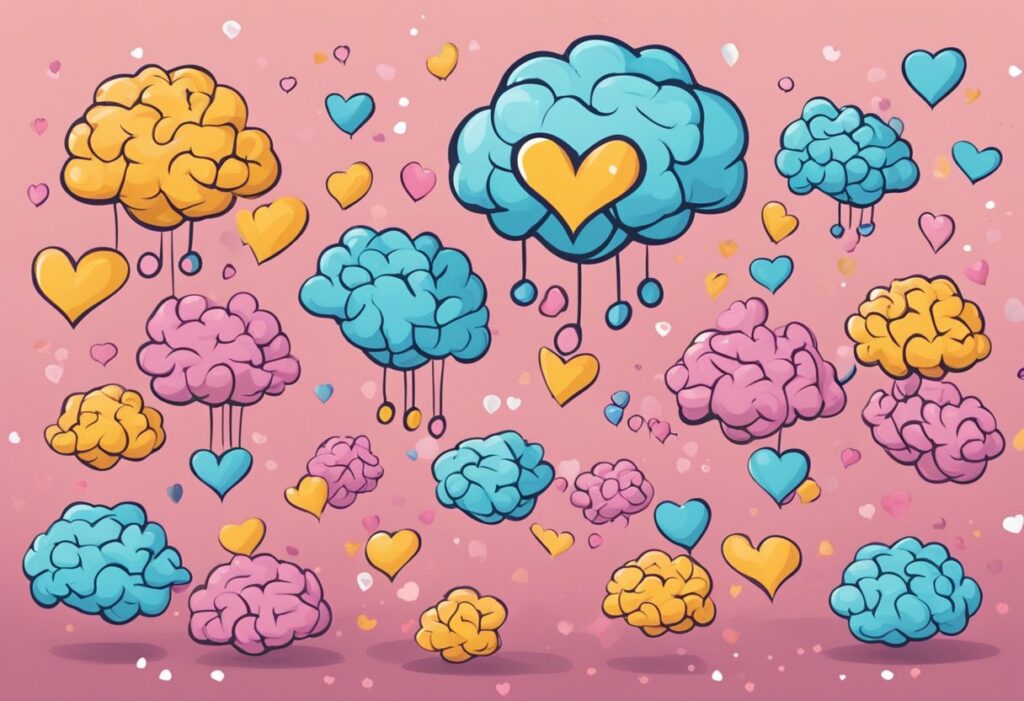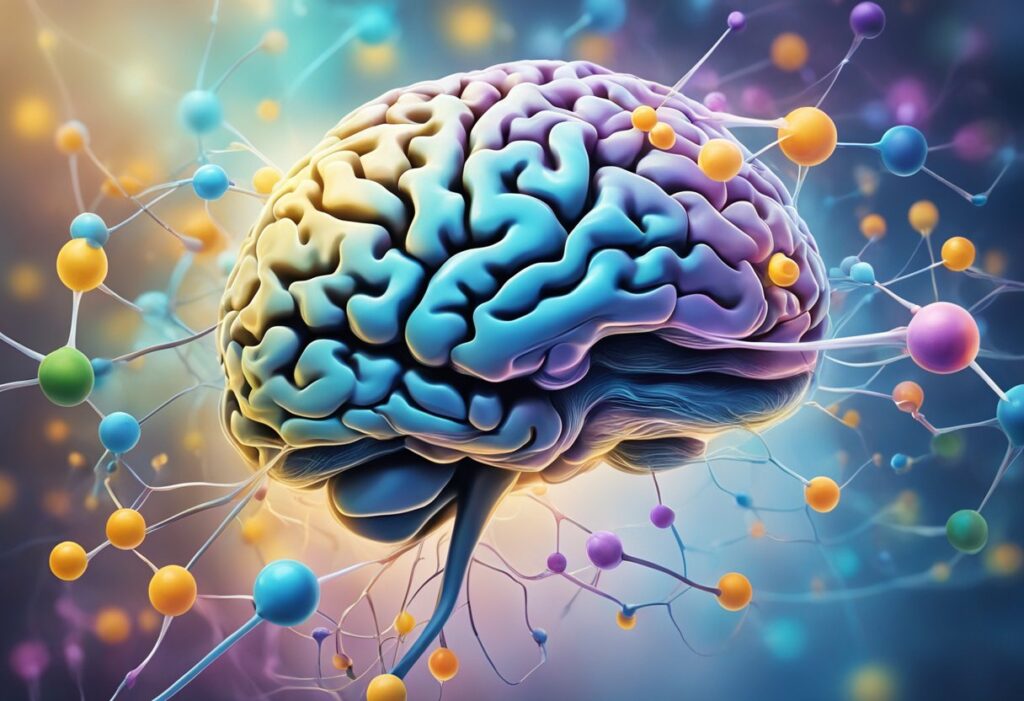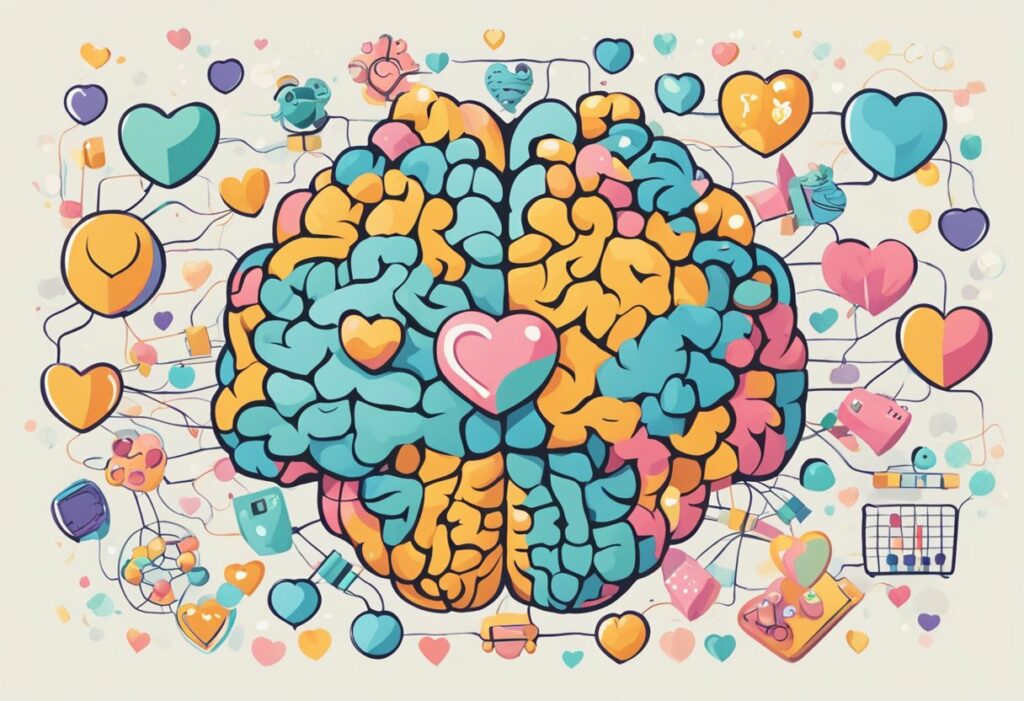Dopamine and Love: Unveiling the Neurochemical Foundations of Joy

Dopamine, often referred to as the “feel-good” neurotransmitter, plays a crucial role in the range of experiences we call love. This chemical messenger is instrumental in the brain’s reward pathway and is associated with feelings of pleasure, desire, and motivation.
As such, dopamine contributes to the emotional high and deep connections associated with romantic relationships. By triggering the reward circuits in our brains, dopamine reinforces behaviors that are essential for species survival, which includes both mating and parental behaviors.
The relationship between dopamine and love extends beyond the initial euphoria of attraction. Long-term attachments are also influenced by this neurotransmitter through its interaction with other brain chemicals like oxytocin, which is often linked with social bonding.
Studies suggest that dopamine-rich areas of the brain are activated in response to loved ones or romantic partners, implicating its role in sustaining relationships.
Dopamine: The Love Neurotransmitter

Dopamine plays a pivotal role in the emotional and physical aspects of love, influencing feelings of pleasure, reward, and desire.
Chemical Structure and Function
Dopamine is a neurotransmitter, a chemical messenger in the brain, with the molecular structure C8H11NO2. It binds to dopamine receptors and influences various bodily functions, including mood, attention, and movement. In the context of love, dopamine is primarily known for its role in the reward pathway, which reinforces pleasurable experiences and motivates individuals to seek out these experiences repeatedly.
- Molecular Formula: C8H11NO2
- Receptors: D1, D2, D3, D4, D5
- Functions in Love: Mood regulation, pleasure, motivation for romantic engagement
Dopamine Pathways and Love
There are several key dopamine pathways in the brain that are involved with the experience of love. The mesolimbic pathway, often termed the “reward pathway,” plays a significant role in love and attachment. It connects with areas of the brain responsible for emotional responses (limbic system) and judgment and decision-making (prefrontal cortex).
- Mesolimbic Pathway:
- Starts: Ventral tegmental area (VTA)
- Ends: Nucleus accumbens
- Role in Love: Rewarding feelings associated with romantic attachment, motivation to pursue potential partners
- Interactions with Other Neurochemicals:
- Oxytocin: Enhances attachment bonds
- Serotonin: Modulates mood and may influence romantic obsession
Dopamine’s Role in Romantic Relationships

Dopamine, a key neurotransmitter, plays a crucial role in the emotional and reward aspects of human romantic relationships.
The Formation of Romantic Bonds
When individuals fall in love, their brains release a surge of dopamine. This chemical serves as a reward signal, often associated with the pleasure experienced when engaging in activities that are vital to survival, such as eating. In the context of romantic bonds:
- Initial Attraction: Dopamine levels increase in response to novel stimuli, including a new romantic interest, triggering a sense of excitement.
- Reinforcement: As the attraction deepens, dopamine reinforces the connection by associating the presence or thoughts of a romantic partner with pleasure.
Dopamine Fluctuations in Long-Term Love
The role of dopamine evolves over the course of a relationship. In long-term romantic relationships:
- Stability: Pleasure associated with dopamine release may subside, but the connection between partners remains reinforced by shared experiences and emotional bonding.
- Attachment: Other neurotransmitters and hormones, like oxytocin, become prevalent, complementing the continued, though less intense, dopaminergic activity to sustain attachment.
Influence of Dopamine on Happiness and Well-Being

Dopamine plays a critical role in regulating mood and overall mental health. Its balance is essential for emotional well-being and happiness.
Dopamine’s Impact on Mood and Emotions
Dopamine is known as the “feel-good” neurotransmitter because of its significant influence on mood and emotions. When dopamine is released in the brain, it creates feelings of pleasure and reward, which motivate individuals to repeat behaviors that triggered its release. This neurotransmitter is involved in many pleasurable experiences, from eating food to engaging in social activities. Low levels of dopamine can lead to feelings of sadness or lack of interest in activities that a person usually enjoys.
Dopamine Levels and Mental Health
The link between dopamine levels and mental health conditions has been well-documented. For instance:
- Depression: Reduced dopamine activity can be associated with symptoms of depression, such as low energy and anhedonia.
- Schizophrenia: This condition is often related to disruptions in dopamine signaling, leading to problems with thought processes and emotional responses.
Consistent dopamine functionality is vital for maintaining mental health. Imbalances can contribute to various psychiatric conditions that influence an individual’s happiness and quality of life.
External Factors Affecting Dopamine

Dopamine levels can be influenced by numerous external factors, including environmental conditions and individual behaviors. Understanding these influences can help in managing dopamine levels effectively.
Lifestyle and Environmental Influences
Stress and Emotional States
- Prolonged stress reduces dopamine transporter levels.
- Positive social interactions increase dopamine production.
Chemical Exposure
- Caffeine and alcohol may temporarily boost dopamine levels.
- Long-term use of nicotine and certain drugs depletes dopamine over time.
Role of Diet and Physical Activity
Nutritional Intake
- Foods rich in tyrosine, such as almonds and bananas, are precursors to dopamine.
- Omega-3 fatty acids found in fish may promote dopamine regulation.
Exercise
- Regular physical activity, especially aerobic exercise, has been shown to raise dopamine levels.
- Even moderate exercise like walking can have a positive effect on neurotransmitter balance.

